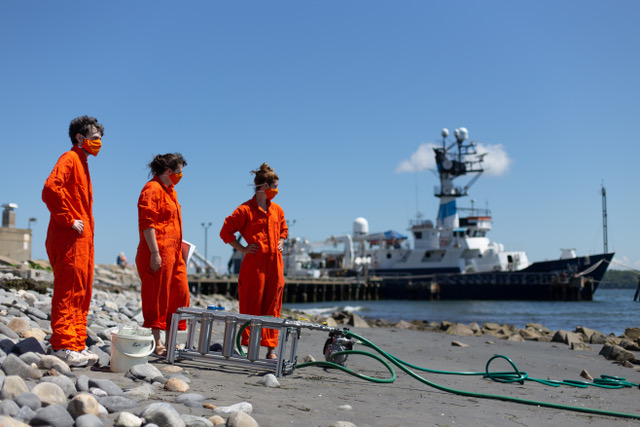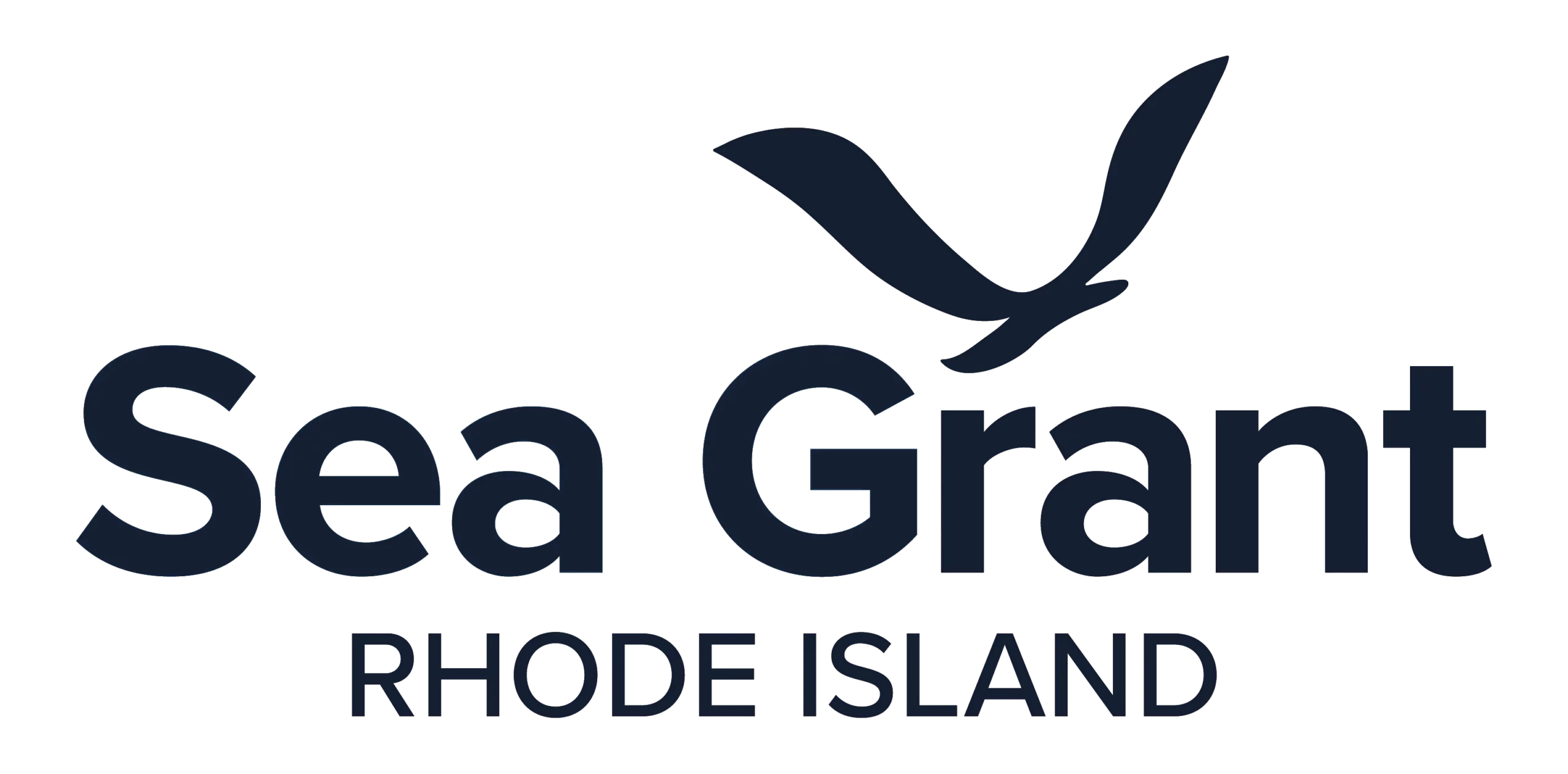Research
Funding
Projects
Planning Grants
Impacts

Applied Science
Sea Grant invests in high-priority research, addressing issues such as coastal hazards and development in coastal communities; understanding our interactions with the marine environment; aquaculture; seafood safety; and fisheries management. The results of this research are shared with the public through Sea Grant’s integrated outreach program to bring together the collective expertise of on-the-ground extension agents, educators, and communications specialists.
We work with stakeholders, academics, businesses, non-profits, and government agencies to apply sound scientific, policy, and legal research findings to ensure a collaborative effort and informed decision-making for managing the state’s coastal and marine resources.
The goal is to ensure that vital research results are shared with those who need it most and in ways that are timely, relevant, and meaningful.
Funding
RESEARCH:
Rhode Island Sea Grant provides funding for scientific research both in the natural and social sciences to improve understanding and management of Rhode Island’s coastal and marine ecosystems.
We provide funding on a 2-year cycle using a rigorous and competitive peer-review process. We choose priority research topics through a collaborative strategic-planning process that engages scientists, our advisory board, our partners, and the public. Currently these topics are:
- Healthy Coastal Ecosystems
- Sustainable Fisheries and Aquaculture
- Resilient Communities and Economies
CONTACT
For more information or assistance, please contact Kim Ohnemus, Rhode Island Sea Grant Workforce Development and Research Coordinator, at kohnemus@uri.edu
Focus Areas
Coastal Ecosystems
Issues affecting coastal ecosystem health—ranging from coastal development, working waterfronts, and food security to sea level rise and renewable energy.
Resilient Communities
Issues that affect community mitigation and adaptation to anticipated climate changes, as well as societal impacts and use of coastal and ocean resources, including community values and management practices.
Fisheries & Aquaculture
Issues such as stock abundance, regulatory structure, marine diseases, and consumer safety that impact the economic, environmental, and social sustainability of fisheries and aquaculture.
Current Projects
2024-2027
This current cycle of research is recommended for funding and pending final approval by NOAA. Projects will investigate monitoring coastal subsidence to better understand coastal communities’ flooding risks, the application of nature-based solutions to coastal erosion, and the impacts of environmental stressors including coastal acidification on oysters and flounder.
Qualifying the Impacts of Coastal Acidification on Rhode Island Shellfish Aquaculture Nitrogen Removal Capacity
LEARN MORE
Principal Investigator (PI):
Robinson Fulweiler; Boston University
Shellfish, such as oysters, help to combat coastal eutrophication and acidification, yet it is unknown how coastal acidification may influence an organism’s ability to remove and store nitrogen–the nutrient largely associated with eutrophication. This project seeks to understand how coastal acidification influences the ability of oysters to extract nitrogen from the water column and store it in the shells and tissue. It also seeks to quantify how coastal acidification alters nitrogen removal via the microbially driven process of denitrification in the sediment surrounding oyster habitats. The team will expose growing oysters to different pH levels and analyze how rates of denitrification change in response to different levels of acidity. The team will also work with aquaculture farms across the state, measuring pH at various locations to improve understanding of how acidity varies in coastal waters.
Monitoring and Numerical Simulations of Natural and Nature-Based Solutions to Coastal Erosion on Block Island
LEARN MORE
Principal Investigator (PI):
Annette Grilli, University of Rhode Island
Co-PIs: Stephen Grilli, University of Rhode Island
Christopher Baxter, University of Rhode Island
Nate Vinhateiro, University of Rhode Island/Coastal Institute
Brian Oakley, Eastern Connecticut State University
Initiated by a request from Block Island residents, this project seeks to investigate nature-based solutions to the increasing threat from coastal erosion and sea level rise to critical infrastructure on Block Island. The project will use scenario-based hydro-morpho dynamic numerical modeling, local stakeholder engagement, and crowd-sourced imaging (via CoastSnap) to assess the feasibility and efficiency of various natural and nature-based solutions to protect highly-vulnerable sections of Corn Neck Rd, a vital roadway connecting the island. Outcomes of this project include a better understanding of the efficacy of natural and nature-based solutions in high-energy wave environments subject to both erosion and rising sea levels.
Understanding Local Changes in Summer Flounder for Improved Sustainable Management
LEARN MORE
Principal Investigator (PI): Corinne Truesdale, RIDEM
Rick Bellavance, Rhode Island Party and Charter Boat Association
Greg Vespe, Rhode Island Saltwater Anglers Association
RIDEM is responding to stakeholder observations of a decline in summer flounder in Rhode Island waters over previous years that are not evident in coast-wide stock assessments. This project seeks to describe summer flounder stock dynamics in Rhode Island waters to understand the species’ response to local environmental change and to better inform management practices. The team will be using tagging and time series analysis to study local movement dynamics and distribution changes. McManus and his team will work with local recreational harvesters to deploy tags and collect information on flounder population size, movement and distribution in state waters. The goal of this project is to improve understanding of summer flounder population in local waters for enhanced science-based management of the resource.
The Interaction of Environment, Genotype and Disease on Juvenile Oyster Survival
LEARN MORE
Principal Investigator (PI): Jonathan Puritz, University of Rhode Island
This project builds on existing research studying the impacts of environmental stressors, including coastal acidification and decreased oxygen, on the health and vitality of the eastern oyster. Dr. Puritz seeks to understand the connection between oysters’ genetic makeup and their susceptibility to environmental stressors and disease. The team will analyze the genomes of lab-grown oysters to detect genetic variants responsible for enhanced growth and survival in high-stress environments. These genomes will be compared to those of wild oysters populations to better inform broodstock selection for regional oyster growers.
Improving Coastal Subsidence Monitoring with Satellite Images and GNSS Data in Rhode Island
LEARN MORE
Principal Investigator (PI): Meng (Matt) Wei, University of Rhode Island Graduate School of Oceanography
Co-PIs: Steven D’Hondt, University of Rhode Island
Pamela Rubinoff, Rhode Island Sea Grant/Coastal Resource Center
Dr. Wei and his research team will use Interferometric Synthetic Aperture Radar (InSAR) to create a precise and detailed vertical land motion map of Rhode Island, with a particular emphasis on coastal communities. By analyzing the rates of subsidence in these areas, they aim to enhance our understanding of coastal flooding risks associated with changing sea levels. Integrating this data with existing datasets will provide a more comprehensive understanding of subsidence in Rhode Island and its potential impacts on vulnerable coastal communities.
Previous Projects
Research Planning Projects
Coastal Access and Climate Change
LEARN MORE
Sustained Access to Rhode Island’s Coast in a Changing Climate (SEA-C)
Principal Investigator (PI):
Nathan Vinhaterio, University of Rhode Island Coastal Institute
Co-PIs:
Elin Torell, University of Rhode Island Coastal Institute
Emi Uchida, URI Environmental and Natural Resource Economics
Jesse Reiblich, URI Marine Affairs
Leah Feldman, RI CRMC
Public shoreline access areas lie on the front lines of climate change – the active coastal zone – where storm surge flooding, sea level rise, and stormwater runoff dynamically combine. Researchers from the Coastal Institute will investigate how climate change may lead to the loss of public lands, identify the user groups most likely to be impacted, and establish the local actions needed to minimize climate impacts, especially for underserved communities.
The proposed project will form an interdisciplinary research team and partner with municipal leaders and other stakeholders in Rhode Island to investigate how climate change may lead to the loss of public lands, identify the user groups most likely to be impacted, and establish the local actions needed to minimize climate impacts, especially for underserved communities.
Through a series of pilot studies in Bristol County, RI the project team will (i) develop baseline geospatial data layers that can be used to identify where existing resources may be threatened or lost due to climate change, (ii) quantify human visitation to coastal access sites through (anonymized) cell location records, focus groups, and surveys, and (iii) perform legal research to prioritize areas for public access designation.
Results of the pilot studies will guide the development of a detailed action plan that identifies research needs and positions the SEA-C team to pursue future grant proposals.
Reframing Coastal Fishing Access
LEARN MORE
More than Recreation: Reframing coastal fishing access in RI as a food security issue
Principal Investigator (PI):
Melva Treviño-Peña, URI Marine Affairs
Co-PI(s):
Patrick Baur, URI Fisheries, Animal, and Veterinary Sciences
Seray Ergene, URI College of Business
Amelia Moore, URI Marine Affairs
Marta Gomez-Chiarri, URI Aquaculture/Fisheries
In recognition of fishing at coastal access points as important within traditional food networks, researchers from the University of Rhode Island have partnered with the Center for Southeast Asians of Rhode Island and the Refugee Dream Center to better understand the usage and barriers for shore fishers.
The proposed project will characterize how different communities seek to improve their food security and overall well-being by fishing public coastal spaces in Rhode Island.
Researchers hope to gain a deeper understanding of coastal resource utilization, nutritional and cultural services provided by local coastal fisheries, and barriers to coastal access.
Moreover, this project will identify areas of disconnect between government agencies and shore fishers, including fishing regulation and licensing, public health advisories, and community knowledge and perceptions of environmental quality and risks.
The results of this study will open new, policy opportunities that strategically reduce barriers to coastal access, recognize the contributions of locally-caught fish to local and regional food security, and foster local food system resilience by highlighting underutilized species and markets.
Sea Urchin Aquaculture
LEARN MORE
Working towards developing sea urchin aquaculture in Rhode Island: A case study for working towards diversification
Principal Investigator (PI):
Coleen Suckling, URI Fisheries, Animal, and Veterinary Sciences
Co-PI(s):
Emily Diamond, URI Communications/Marine Affairs
Researchers, in partnership with Matunuck Oyster Bar Hatchery and Quonnie Siren Oyster Co., will look at the feasibility of rearing sea urchins to diversify Rhode Island aquaculture, which is primarily focused on oysters and mussels.
Sea urchins are resilient to ocean acidification, have a low environmental production footprint, are increasingly in demand, and there is emerging interest in the aquaculture industry to grow them.
The project goal of this project is to establish a network that could sustain a regional sea urchin aquaculture industry by initiating production in Rhode Island.
Social and natural scientific approaches will be used to recruit and engage with regulation, aquaculture, consumers and ecosystem management stakeholders in network-building workshops to identify the opportunities, priorities, risks, and challenges for diversification from these broad perspectives.
A case study using a new potential product of sea urchins will contribute to these and comprise of: 1) targeting fishers and divers through surveys, interviews and assisted sampling/dive surveys to find green sea urchin broodstock and; 2) an experimental trial at an oyster farm to determine whether purple sea urchins can be marketable and/or used to reduce shellfish biofouling species.
IMPACTS
Rhode Island Sea Grant has funded hundreds of projects over the last 50 years that have resulted in hundreds of more peer-review publications that have helped to advance scientific knowledge of Rhode Island’s coast, as well as help guide state policies concerning ecosystem health, coastal resilience, sustainable seafood, and offshore development.
“Rhode Island’s coastal habitat and fisheries are an essential part of our culture and economy. The University of Rhode Island is a national leader in ocean research and conservation, and the Sea Grant program has been a vital partner in carrying out cooperative research and strengthening our coastal communities.”
Senator Jack Reed (RI)
Ranking member of the Appropriations Subcommittee on Commerce, Justice, Science (CJS), and Related Agencies
Search Sea Grant Databases
To find a complete list of our research impacts and accomplishments, visit the National Sea Grant’s website to search by program, year, and topic.

